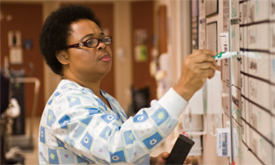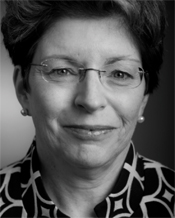Development efforts help strengthen the profession

MD Anderson’s nursing professional development program is nurturing a proud legacy today and for the future.
With a wide array of programs that enhance and support the development of students and professionals at virtually every level of the nursing workforce, MD Anderson is among the most progressive institutions in the nation for preparing, retaining and engaging top-flight oncology nurses.

Lorretta Ilochi, clinical nurse, updates the information board on an inpatient floor.
Currently, more than 2,800 nurses work in about 40 different job titles that span all mission areas and make up about 15% of MD Anderson’s total workforce. With the complexity of cancer and its many complications, nursing at MD Anderson is a vital and specialized discipline that summons the highest level of critical thinking and clinical expertise as well as collaboration, caring and leadership.
As the institution grows with the opening of the Alkek Hospital expansion, as projections for new patient registrations continue to tick upward and as cancer treatments, clinical trials and diagnostics become even more sophisticated, recruiting and retaining high-quality nurses is a priority.
That’s where the strategy of nursing workforce development comes in, and it’s a strategy that pays dividends.
Introducing oncology nursing
By offering a wide range of development programs that include academic preparation, clinical practice, mentoring and professional growth, MD Anderson not only exposes students, new nursing graduates and seasoned professionals to oncology, but also prepares them for advancement, refines their skills and gives them the confidence so important to quality care.

Jan Keller, Ph.D., registered nurse and director of
Nursing Workforce Planning and Development,
leads a dynamic team of professionals who develop
and oversee a broad spectrum of nursing education
programs.
The return on investment with such programs has yielded a higher retention rate, particularly among new nurses, opened a steady stream of top-notch applicants and generated a buzz among student nurses now enthusiastic about oncology and MD Anderson. But the most important result is seen in exceptional nurses who also are well-rounded, motivated people and who often remain at MD Anderson as clinical nurses or nursing leaders.
One example is the Rising Stars, a one-year program for select, high-performing nurses who want to develop additional clinical leadership skills and learn more about collaboration and team building, evidence-based practice and quality improvement. Implemented in 2006, the Rising Star program has generated more than 80 clinical nurses who continue to lead at the patient’s bedside; 87% of the graduates have remained in direct patient care.
Another example is the “Launch into Nursing” New Graduate Nurse Residency Program that is part of the formal MD Anderson nursing orientation process. Residents are newly graduated clinical nurses who participate in a year-long mentoring program that includes structured classes and activities designed to build their interpersonal, critical thinking and technical skills. The program supports residents during the critical transition from student to novice practitioner.
Education at all levels

Debbie Cline, oncology nurse and project manager of Nursing
Workforce, leads the Rising Stars Program and the Certified
Nursing Assistant Cohort Program. She also collaborates with
colleagues to create integrated and unique educational opportunities.
There are other nursing workforce development programs:
- The Advanced Practice Nurse Fellowship, a one-year program of clinical study that embeds mid-level providers in comprehensive oncology care
- The Professional Student Nurse Extern Program, a curriculum in the summer and throughout the year that gives nursing students the opportunity to work at MD Anderson alongside a registered nurse preceptor
- Nursing Student Clinical Placement, an opportunity that offers coordination of nursing student clinical rotations, corresponding to didactic classes in the university classroom
- Multiple programs that reach out to elementary, junior and senior high school students who show interest in nursing, medicine and science
Complementing these nursing education programs are nursing academic cohorts supported by the institution, which pay tuition and fees upfront for any employee who wants to pursue an initial degree in nursing or nurses who would like to earn advance degrees while still working. Nurses use the funding from the tuition reimbursement program more than any other group in the institution, and the Division of Nursing provides supportive resources to help the nurses be successful.
Critical thinkers, caring partners
Barbara Summers, Ph.D., vice president and chief nursing officer, says that education programs are vital to affirming the value of nurses, building and retaining the nursing community at MD Anderson, and strengthening the profession.
Also read:
Externs Develop Confidence, Love of Nursing
Nursing Fellowship Highly Sought After
“Research tells us that patients have better treatment outcomes where there is a well-educated, highly competent nursing staff,” says Summers, who has led MD Anderson’s Division of Nursing for the last seven years. “When you look at our program, envision a flywheel that spins evenly and constantly across all levels, and along the way, you can see the momentum of the wheel in the faces of many great nurses and nursing leaders. All are exceptional people who are homegrown and inspired to teach and mentor not only our newest nurses and students, but also all of their colleagues.
“My vision for these programs is about more than ensuring we have nurses to staff our units and clinics. Our nurses are critical thinkers, the caring partners and the constants in every patient’s journey, and it’s incumbent upon us to maximize their talents and opportunities,” says Summers, an oncology nurse her entire career. “The ultimate beneficiaries of all our nursing development programs are our patients, which is why we all became oncology nurses.”












